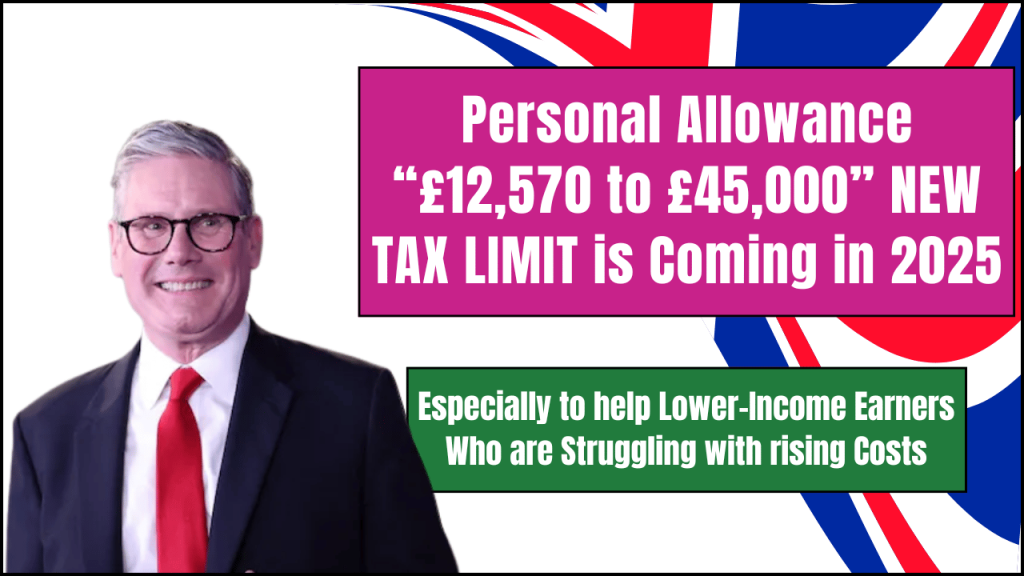
The UK tax system may soon see a major change that could bring much-needed relief to millions of people. A new proposal suggests raising the Personal Allowance—the amount of money you can earn before paying income tax—from £12,570 to £45,000 starting in 2025. This bold idea is especially focused on helping low- and middle-income earners who are struggling with the rising cost of living.
What Is the Personal Allowance?
In the UK, everyone has something called a Personal Allowance. This is the amount of money you’re allowed to earn each year without paying any income tax.
As of now, in 2025, the Personal Allowance is £12,570. That means if you earn less than that amount in a year, you don’t pay any income tax at all. If you earn more, only the amount above £12,570 is taxed.
For example, if you earn £20,000 in a year:
- You don’t pay tax on the first £12,570.
- You pay tax on the remaining £7,430.
This system is meant to help make taxes fairer. But many people believe that £12,570 is far too low in today’s economy.
DWP £200 Cost of Living Payment 2025, Financial Help for Struggling UK Households
UK £250 Cost of Living Payment Arriving in April 2025, How to Check if You Qualify
DWP £18,570 Tax-Free Income 2025, Understanding Your Financial Rights
Why Do People Want It Increased to £45,000?
Supporters of the new proposal say the current allowance hasn’t kept up with the rising cost of living. Prices for food, fuel, rent, and other basic needs have gone up significantly in recent years, but the Personal Allowance has stayed the same for a long time.
Here’s why people want it raised to £45,000:
- More money in your pocket: If you earn under £45,000, you wouldn’t have to pay any income tax at all.
- Helps those who need it most: Low- and middle-income workers often live paycheck to paycheck. Giving them more of their income back can ease daily stress.
- Fights inequality: Wealthy individuals often have ways to reduce their tax bills, while ordinary workers pay tax on almost every penny they earn.
In short, people believe that raising the allowance would give fairer treatment to hard-working individuals who are just trying to get by.
How Would It Help Low-Income Earners?
Let’s say the allowance is raised to £45,000.
Anyone earning below that amount would keep all of their income without paying a single penny in income tax. That’s a big deal!
This change would:
- Give families extra money for bills, food, and savings.
- Help people deal with high inflation and rising living costs.
- Let workers feel that their hard work is being rewarded.
- Allow small businesses and self-employed people to grow without being heavily taxed.
It would reduce the tax pressure on those who are already struggling, making life more manageable.
Who Would Benefit the Most?
The biggest winners would be:
- People earning less than £45,000 per year.
- Families with children trying to balance school costs, rent, and groceries.
- Young people just starting their careers.
- Retirees working part-time to supplement pensions.
Right now, someone earning £30,000 pays hundreds—or even thousands—of pounds in income tax. If the new limit takes effect, all that money would stay in their hands.
That’s why many are calling this proposal a “lifeline” for the working class.
Is the Current System Unfair?
Many critics believe that the UK’s current tax system actually hurts poor and middle-income earners more than it helps.
While someone earning £20,000 is taxed after £12,570, a millionaire can often reduce their tax using investment loopholes or business arrangements. These are legal methods, but they give an advantage to the wealthy.
That means:
- Lower earners pay a larger percentage of their income in tax.
- Wealthier people may end up paying less tax overall as a percentage of what they make.
Raising the Personal Allowance would be a step toward closing that gap and making things more equal.
What About the Government’s Income?
It’s true that if fewer people pay income tax, the government will collect less money. This could mean less funding for services like healthcare, education, and infrastructure—unless other taxes are adjusted.
However, supporters argue that the benefits will outweigh the losses. Here’s how:
- More money for people means more spending, which can help the economy grow.
- Families who keep more of their income may rely less on government support, reducing the need for benefits.
- When people feel financially secure, they’re more likely to invest in their future—buying homes, starting businesses, and saving for retirement.
Some suggest that the government could raise taxes on the very wealthy or large corporations to make up the difference. Others think more efficient government spending could fill the gap.
Is It Realistic?
The proposal to raise the Personal Allowance to £45,000 is still being discussed. It’s not official yet, and not everyone agrees with it. Some say it’s too expensive, while others worry it may cause inflation or budget cuts elsewhere.
But the idea is gaining popularity, especially among people who feel the current system doesn’t support them.
With inflation still high, housing prices increasing, and wages staying flat, there’s growing pressure on the government to act. Whether they go all the way to £45,000 or take smaller steps, many believe something needs to change—and soon.
Final Thoughts
Raising the Personal Allowance from £12,570 to £45,000 could be one of the biggest tax changes in the UK in years. While it may seem like a bold move, it could bring meaningful relief to millions of people who are just trying to make ends meet.
This isn’t just about taxes—it’s about fairness, opportunity, and giving everyone a chance to live with dignity.
As the debate continues, one thing is clear: more and more voices are calling for a tax system that truly works for everyone—not just the few at the top.